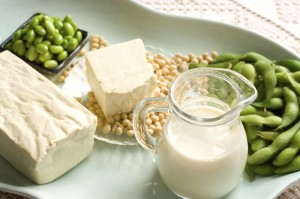3rd December 2014
Guest Writer for Wake Up World
Soy has been incorrectly passed off as a health food for a long time. Soybean oil, soy milk, and even tofu are a staple in the lives of many people, especially vegetarians. However, most soy products are not real food — most are highly processed and genetically modified. In my opinion, the marketing of soy as a health food is probably one of the greatest bamboozles of all time.
One of the issues concerning soy is its high level of phytoestrogens — compounds that mimic estrogen in the body. Soy contains two primary phytoestrogens, sometimes called xenoestrogens, genistein and daidzein. Both compounds are known to disrupt the endocrine system in males and females. [1] These, and all, estrogen compounds are classified as isoflavones.
Isoflavones are estrogen mimickers that increase estrogenic activity. This may be helpful at times for relieving symptoms in menopausal women. [2] However, more often than not, isoflavones block and replace naturally-produced estrogen, an action that many experts believe is cause for concern.
[pro_ad_display_adzone id=”110028″]
So what happens when things get out of balance?
How Soy Upsets Hormonal Balance
1. Contributing to Premature Menstruation
Girls are reaching their first menstruation at earlier ages, now more than ever. Fifty years ago, it was common around a girl’s 13th birthday. Now it’s hitting girls under 10. Studies on young female rats suggest soy is a contributing factor.
2. Leads to Gynecomastia
If this doesn’t scare men away from soy, nothing will. Gynecomastia — male breast enlargement — has been tied to soy consumption. [3] [4]
3. Kills Male Libido
Introducing estrogenic foods like soy into their diet can cause men to experience a loss of sexual desire. [5]
4. May Cause Infertility
Soy may be a factor behind male and female infertility. [6]
5. Linked to Breast Cancer
There’s no denying the connection between xenoestrogens and breast cancer. Considering that breast cancer cells require stimulation via estrogen, it may be a wise idea to keep your consumption of estrogen and estrogen-like compounds in check, from all sources, including soy. [7]
Soy – a Toxin in Disguise?
Perhaps the biggest problem with soy is we’re not fed this product in small amounts. Soy is a cheap, subsidized ingredient used in processed foods in the form of oil, thickeners, flavor enhancers, stabilizers, preservatives, and nutritive fillers. Check the ingredients, if you’re eating processed food, you’re probably eating soy.
Fermented soy, like tempeh and natto, can be really healthy since the goitrogens and nutritive inhibitors are significantly reduced. Regardless, keep in mind that most soy, even fermented, is likely to be GMO. When it comes to non-organic and unfermented soy, I’ve personally added it to my “avoid” list.
What are your thoughts on soy? Do you eat it? If so, what types of soy foods do you use? Please share with us your thoughts in the comments!
– Dr. Edward F. Group III, DC, ND, DACBN, DCBCN, DABFM
References:
- Janice Barlow, RN, NP, Jo Ann P. Johnson, MPH, and Lacie Scofield, MSPH. Early Life Exposure to the Phytoestrogen Genistein and Breast Cancer Risk in Later Years FACT SHEET on the PHYTOESTROGEN GENISTEIN. Breast Cancer and the Environmental Research Program.
- Cheng G, Wilczek B, Warner M, Gustafsson JA, Landgren BM. Isoflavone treatment for acute menopausal symptoms. Menopause. 2007 May-Jun;14(3 Pt 1):468-73.
- Valladares L, Garrido A, Sierralta W. Soy isoflavones and human health: breast cancer and puberty timing. Rev Med Chil. 2012 Apr;140(4):512-6. doi: 10.4067/S0034-98872012000400014.
- Department of Biological Sciences. Answers to FAQs about Soy Isoflavones, Soy Infant Formula and Puberty. LeHigh University.
- Siepmann T, Roofeh J, Kiefer FW, Edelson DG. Hypogonadism and erectile dysfunction associated with soy product consumption. Nutrition. 2011 Jul-Aug;27(7-8):859-62. doi: 10.1016/j.nut.2010.10.018.
- Chavarro JE, Toth TL, Sadio SM, Hauser R. Soy food and isoflavone intake in relation to semen quality parameters among men from an infertility clinic. Hum Reprod. 2008 Nov;23(11):2584-90. doi: 10.1093/humrep/den243.
- Russo J, Russo IH. The role of estrogen in the initiation of breast cancer. J Steroid Biochem Mol Biol. 2006 Dec;102(1-5):89-96.
Previous articles by Dr. Group:
- Natural Remedies for Ovarian Cysts
- B-12: The Miracle Vitamin
- 6 Things You Must Know About Colloidal Silver
- The 9 Best Herbs for Lung Cleansing and Respiratory Support
- 7 Best Foods to Support Kidney Function
- How to Flush the Liver
- Lung Cleansing With Peppermint Oil
- The 5 Most Common Thyroid Disorders and What You Need To Know
- Nine Shocking Dangers of Fluoride Exposure
- Seven Facts You May Not Know About Coconut Oil
- 10 Best Herbs for Boosting Female Sex Drive
About the author:
 Dr. Edward F. Group III (DC, ND, DACBN, DCBCN, DABFM) founded Global Healing Center in 1998 and is currently the Chief Executive Officer. Heading up the research and development team, Dr. Group assumes a hands-on approach in producing new and advanced degenerative disease products and information.
Dr. Edward F. Group III (DC, ND, DACBN, DCBCN, DABFM) founded Global Healing Center in 1998 and is currently the Chief Executive Officer. Heading up the research and development team, Dr. Group assumes a hands-on approach in producing new and advanced degenerative disease products and information.
Dr. Group has studied natural healing methods for over 20 years and now teaches individuals and practitioners all around the world. He no longer sees patients but solely concentrates on spreading the word of health and wellness to the global community. Under his leadership, Global Healing Center, Inc. has earned recognition as one of the largest alternative, natural and organic health resources on the internet.
For more information, please visit Global Healing Center.
[pro_ad_display_adzone id=”110027″]







